|
 |
|
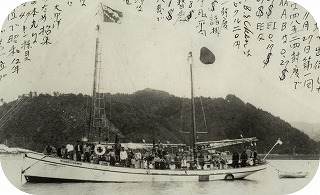 |
| Hinomoto-maru ↑ ↓ Pearl Oyster |
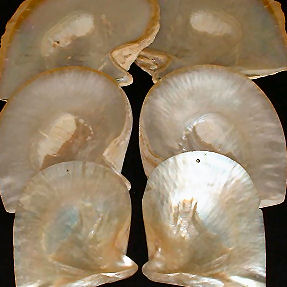 |
|
|
It is May, 2011.
I will be 71 years old in 10 days. This one year until my coming birthday
has had considerable events of tragedy in Japan and the world, among which
the Great East Japan Earthquake and the civil wars in Middle East and Africa
will drag on in the future.
For myself, it has been a year of turning point in my life. Not only I
got to the seventies but I got over my father's life.
I cannot resist getting weaker in body. I have been taking pills of a blood
flow and blood pressure every morning and night. I believe I overcame large
intestine cancer a couple of years ago, but I have been aware of it in
the toilet most of the time. I am going to have a regular checkup after
this trip "Shirahama, Southernmost Boso, April 2011".
To be healthy is the most important thing until the end of my life. I have been taking an exercise of tennis and golf at Fellows once a week.
What about my vitality?
My homepage "Viva, Seniors!" (中高年の元気!) is the basis for the judgment.
Essays of travels and daily life have fairly been continuing in numbers
and volumes, which I have to be satisfied with. I am worried about feeling
reluctant to travel abroad nowadays.
Anyway, "Viva, Seniors!" exists in sound mind and sound body.
With this and that, I have tried several things during my age of 70.
I would like to put together here what I did well, though they are all
carrying the past and lack of freshness.
|
|
|
Novel "An Interesting Man" and Mr. Shingu
My father died 41 years ago at the age of 69. It was one month before my
company Daido Steel sent me to the United States to study abroad.
I do not remember to have talked much with him, but I decided to write
his life 10 years ago.
I chose a novel style and connected 3 anecdotes, and then stopped for a
long time, showing them on my homepage.
4 years later I received an email from Mr. Masaharu Shingu, a novelist
from my hometown Shingu City, saying "I have read it through."
I asked him to meet me in high spirits.
I visited him at a hospital in Kokubunji in April, 2004.
|
|
Mr. Shingu in pajamas led me to the lounge and talked in hometown dialect to me more than 2 hours all the way with smile, drinking canned coffee.
The name of the novel was then "Omoroi Otoko" (An Interesting
Man). Mr. Shingu's eyes came to look serious in the review, leaning forward.
He gave me his comment as follows in my memory.
|
The novel title needs some refinement. It is a little too light.
The character's name is too near to the real person. Too heavy. You probably
cannot write his love scene by his present name. Names have their own personalities.
Conversations are few. They are important in order to be readable.
Visit the sites, like Arafura Sea, Thursday Island, Cairns, ....., and
your world will be changed.
There are a couple of crucial points in the technique of novel making.
The first part of the manuscript writing paper has to be simple and elegant.
One section consists of 5 papers. One chapter consists of 20 papers, ...... |
|
What a precious encounter it was to me! Most regretfully Mr. Shingu, a
novelist, passed away in August that year, less than 4 months after the
meeting.
|
|
|
The Story of the Auditorium Where Monsters live
Just after I met Mr. Shingu, I made up my mind to attend the lecture of
novel making in the community center of Urayasu City. I learned the necessary
matters to make a novel from the element to the protocol under Mr. M, a
prominent instructor.
I tried to make a long novel. The title was then "The Story of Kanemori
Auditorium".
During the days, I met Mr. O in the lecture among the students. I noticed
afterward that his novel had received the award.
Mr. O, about 50 years old, was a man of few words. But different to me.
He was outspoken in his remarks to my work.
When he finished reading the script of "The Story of Kanemori Auditorium",
he dismissed it saying "This novel-like document is only a little
bit better than an essay written by an elementary amateur."
Even if it was true, I did not feel good at all. I murmured at heart "Sarcastic
guy!"
"But wait", I told myself.
I asked him to accept me as his pupil. He agreed to accept me as a friend.
When I happened to be hospitalized with large intestine cancer, Mr. O visited
me twice and gave me the intensive training at the lounge.
After one year and a half I lost my breath and handed out the final script
to him. In several days his comment was "You came to the starting
level at last."
I stopped keeping in touch with him since then.
|
|
I corrected it in my way and changed the novel title to "Romanesque
and the Four-God Statue" and finally to "The Auditorium Where
Monsters Live" which is carried in my homepage as the 46th-48th story
of the Zakkicho Square.
I thought I had branded myself as no ability to make a novel, but in May
last year, at the age of 70, I wanted to improve my novel "An Interesting
Man". It was because I came to the age over my father and the feeling
of respect and friendliness to him welled up inside me.
The improvement work took me 4 months, and finally it appeared as the title
of "A Life of Kyozo Uozumi" with the double volume of the previous
one. It contains the introduction of a local village Miwasaki, his hometown.
What will Mr. O say about this novel?
I don't think it is a wonderful workmanship myself, but it shows my ability.
I honestly console myself by thinking that it may become a kind of family
legend to my children.
|
|
| New Square "My Favorite Haiku Poets"
Our couple made a trip around Madarao Plateau in Nagano Pref. in September
last year.
It is located at the prefectural border with Niigata Pref, and near Nojiri
Lake.
The first day: at Zenkoji Temple and the Art Museum of Kaii Higashiyama.
The second day: at the Cosmos Park full of dahlias and at Memorial Museum
of Kobayashi Issa, a poet in Edo period, at Shinano Town where Issa was
born and spent his later years. We enjoyed the garden surrounding the museum.
|
|
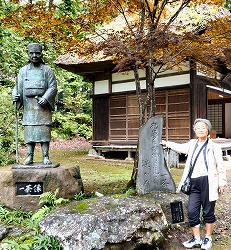 |
|
|
I got a hint from a small book bought at the Issa Museum, and I decided
to make a new square "My Favorite Haiku Poets" in my homepage
"Viva, Seniors!".
I have been copying the haiku poems I like. So far 500 poems of Issa, nearly 1000 poems of Basho, and poems of Ryoukan, Buson, Shiki, Soseki, .....
My another secret intention was to gather up Emiko's haiku poems here.
She disliked my intention at first, but later gradually became cooperative,
and so I have picked up about her 700 poems from the haiku book "Kumotori"
since more than 10 years ago.
All of this work has been helpful to my killing time.
|
|
| Travel around Morocco
Our couple joined in the tour by Hankyu Trapics in November and traveled
around Morocco of North Africa for 10 days.
I thought I stopped traveling in Africa after the travel around Egypt in
2008. So, this trip was due to my impulsive decision. However, it gave
me a wonderful memory.
|
|
|
|
|
|
After coming back, I began the travel essay. I determined to make a good
work thinking of my age of 70.
Though I measured I had spent time considerably, it was only a month to
finish it.
It became a long essay with my total reading time of 2 hours and 25 minutes,
which was 1 minute and 30 seconds shorter than the eassy of the Great Britten
2004, the longest.
I wrote the World Heritage Sites we visited this time, set with various
memories and associations.
Emiko's estimation was just so so.
|
|
|
Learning America through Famous Speeches
Since at the age of 62, I have made quite a travels abroad.
China, Vietnam, Cambodia, Thailand and Singapore in Asia. Others are Britten,
France, Italy, Spain and Portugal, the countries of Balkan Peninsula, Middle
Europe, Eastern Europe, North Africa, .....
The countries waiting for me to visit from now on are Northern Europe,
Benelux Countries, the west coast of America, Australia, .....
My secret pleasure during travels abroad is the interaction with local
people with gestures. Simple local words of greeting are really instrumental.
In addition, the international language, English. The desire to learn English
more has increased in proportion to the travels.
In high school days I became absorbed in English, pleased with good grades.
Before entering university, I wanted to be an English teacher in the future.
But as soon as I entered it, I lost my enthusiasm for learning academic
studies including English, and spent 4 years doing nothing.
Daido Steel, which I entered just after the graduation of university, sent
me to Pennsylvania State University for one year as a student, probably
because it somewhat appreciated my English ability.
Based on the experience, the company let me work in New York with my family in my early forties. It was, to my regret, discontinued by my illness "brain infarction" all of a sudden.
For this reason I quit Daido Steel after a couple of years, and since then
I have been unrelated to English for more than 20 years.
In talking about my English, it was based on the Japanese way of English
for the entrance examination to university, mainly of grammer and text
interpretation. It was not helpful to English conversation even for the
several years stay in the United States.
And now, I strongly feel lack of vocabularies, too. I have forgotten many
many words, not to mention idioms.
I have experienced a number of travels abroad with Emiko, my wife, since
over my age of 60. It made me realize my enthusiasm in English conversation,
and I started learning it as written above.
As for speaking, it may be covered by the help of gestures, though stumbling
and irritating with impatience.
The problem is listening. I honestly feel I understand sometimes all right,
but I cannot understand most of the voices of "Spoken American English"
I used to learn like the Bible, not to mention CNN on TV and English movies.
Why?
One important reason is "speed". The two books of "Learning
America through Famous Speeches" must be very instrumental as a helper
to get over my trouble.
"Perfect timing", "The eyes say more than the mouth",
"You, understand what I am saying!", these are somewhat the present
situation in Japan, aren't they?.
I do not like to say Japan is behind other countries in the culture of
words, but I believe the understanding through words is mainly the starting
point of communication not only in Europe and the United States but except
in Japan.
It may be said especially for addresses. Public speakers giving out their
enthusiasm are dealing with the audience with all their strength.
What about the audience? Most of them are public people different in races, religions and ideas. I can imagine each of them is listening to each address seriously. I feel the close contact of heart among the speaker and the audience in the books.
If the address contains difficult words and expressions, it should not
be sympathized by the public. The addresser's self-satisfaction may make
him dig his/her own grave due to the public's hatred. Therefore most of
the addresses are done by easy words and expressions. Believing this way,
I am going to face the two books.
The difficult thing is the discrepancy among my present level, the improving
curve and durability.
I firstly have copied all address extracts in the books. Secondly, I have
continued to listen to the voices in the affiliated CDs and to read immitating
them. My total reading time is 4 hours, half of which are in my homepage
because they are without copyright now.
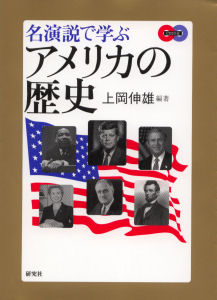 |
|
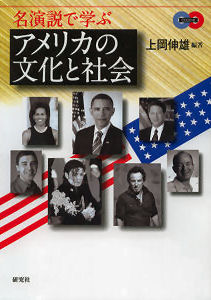 |
|
|
|
|
Learning American History through Famous Speeches (left) |
|
|
Learning American Culture and Society through Famous Speeches (right) |
|
|
|
|
| I know I get bored easily. I wish I will improve the ability of English conversation in my way, not running out of steam. |
|
|
Our couple will join in "The Utmost Capes and Railway Stations for
11 Days" this month (May, 2011) from 13th.
Cape Kouzaki-bana, the westernmost cape of Japan near Sasebo, Cape Sata,
the southernmost cape in Kyushu, Cape Nossapu, the easternmost cape in
Hokkaido, and Cape Soya, the northernmost cape near Wakkanai. Our tour
will mostly be done by train.
This is my first long trip since over the age of 70.
If I write its travelogue after coming home, it will be the re-start of
long essays in my homepage "Viva, Seniors!" since then.
My present feeling is far below "No road before me and a new road
made behind me" (Kotaro Takamura). My both body and mind are not too
perfect to keep the refreshing spirit.
However, I feel happy to have this trip. I wish to proceed my life in my
way with the same heart of people in the disaster area.
|
|
| Reading 22' 28" |
|
|
|
|
|
|
|
|